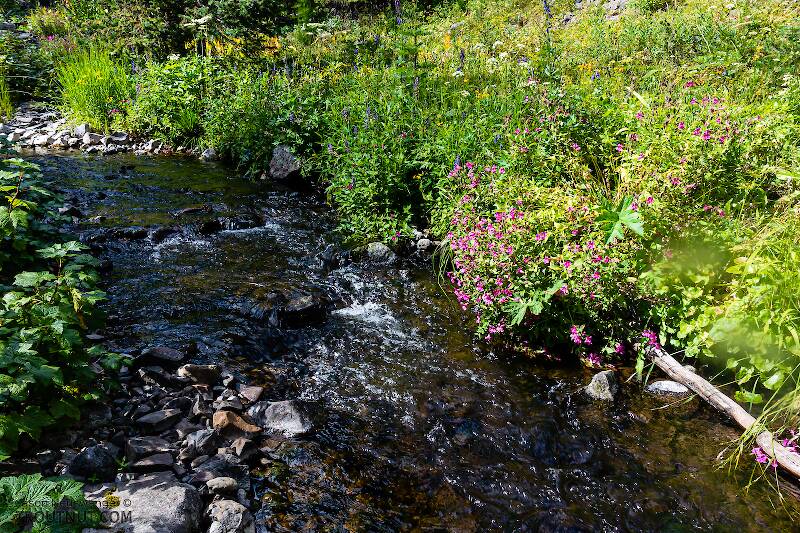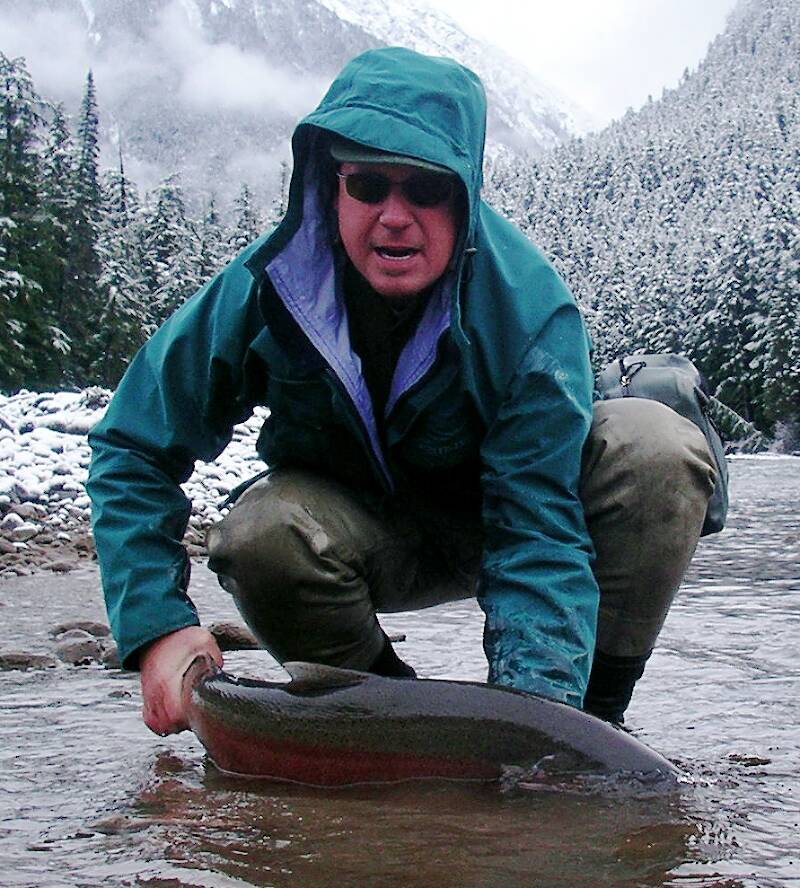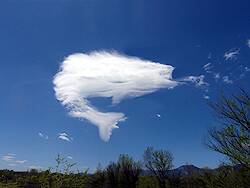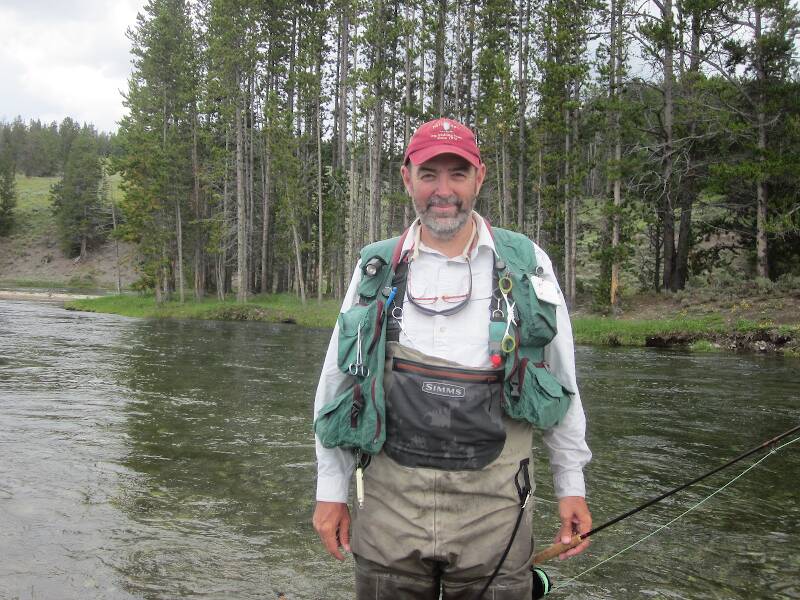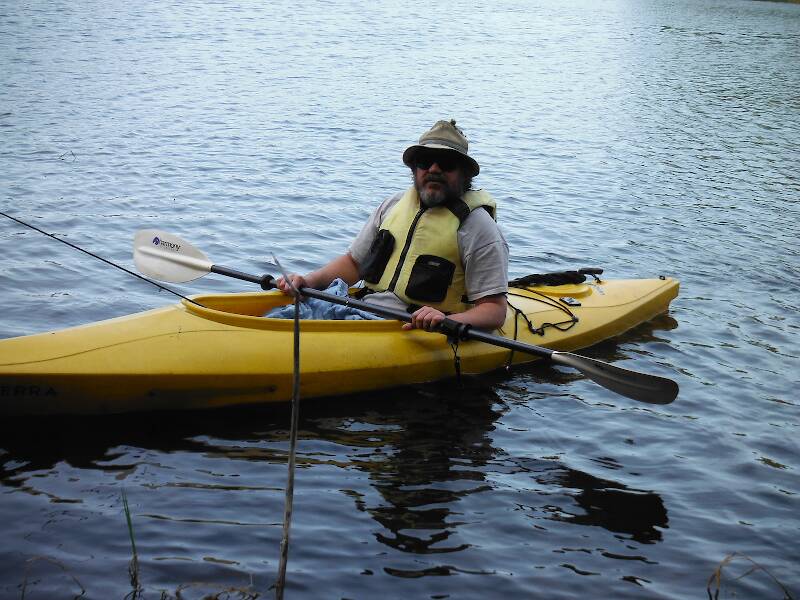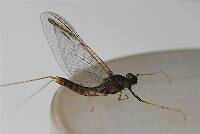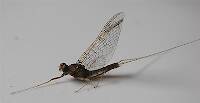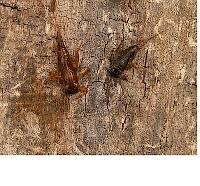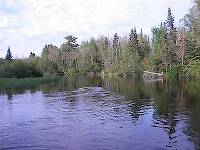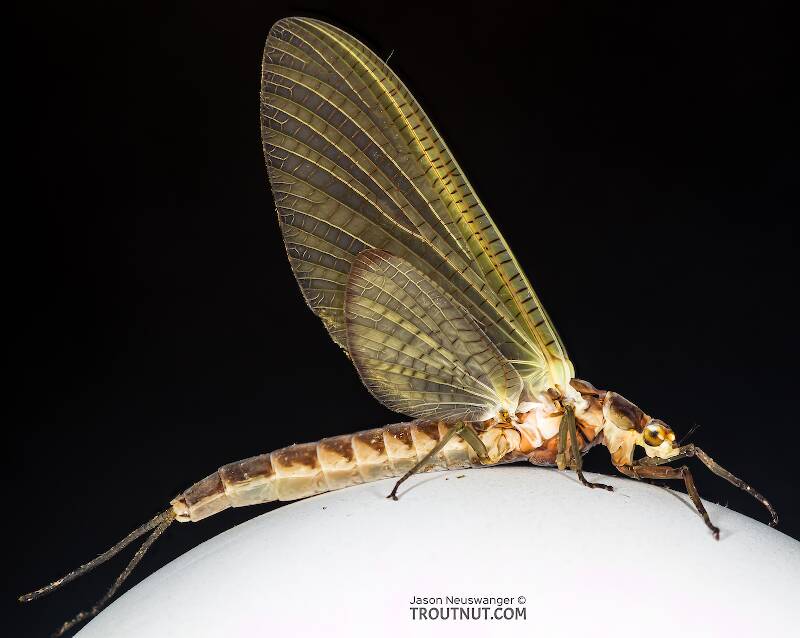
Hex Mayflies
Hexagenia limbata
The famous nocturnal Hex hatch of the Midwest (and a few other lucky locations) stirs to the surface mythically large brown trout that only touch streamers for the rest of the year.
Featured on the forum
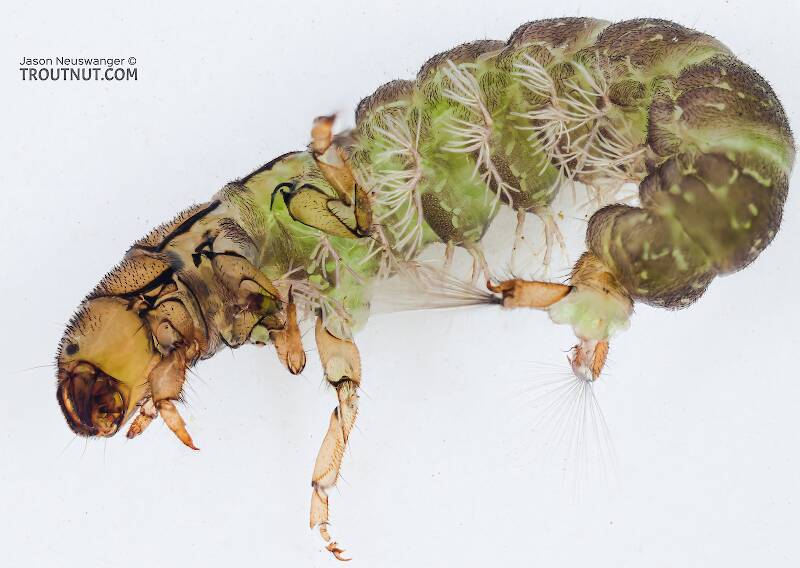
With a bit of help from the microscope, this specimen keys clearly and unsurprisingly to Hydropsyche.

Troutnut is a project started in 2003 by salmonid ecologist Jason "Troutnut" Neuswanger to help anglers and
fly tyers unabashedly embrace the entomological side of the sport. Learn more about Troutnut or
support the project for an enhanced experience here.
Oldredbarn has attached these 5 pictures to aid in identification. The message is below.
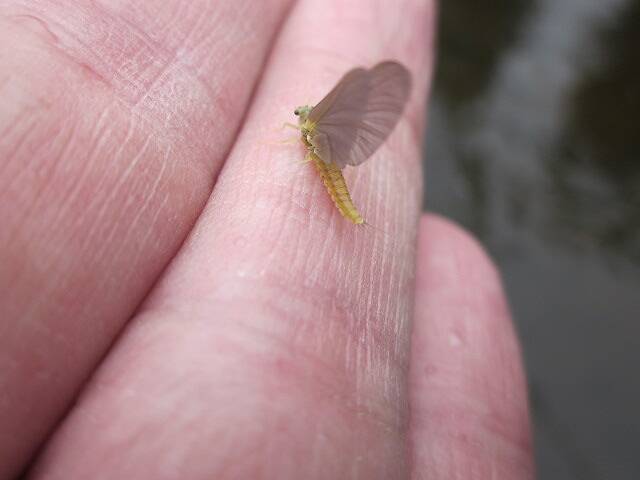
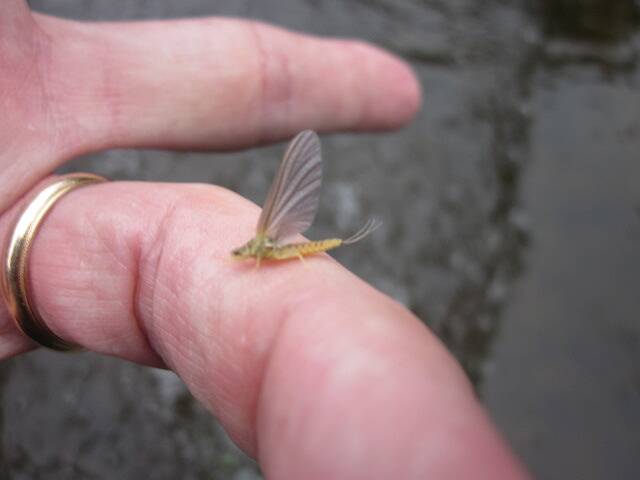
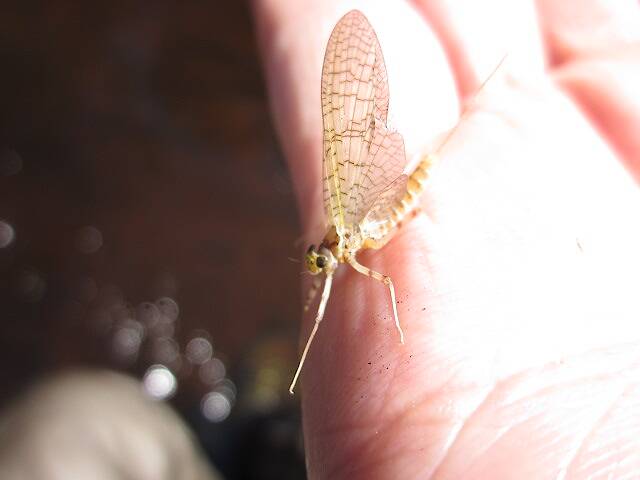
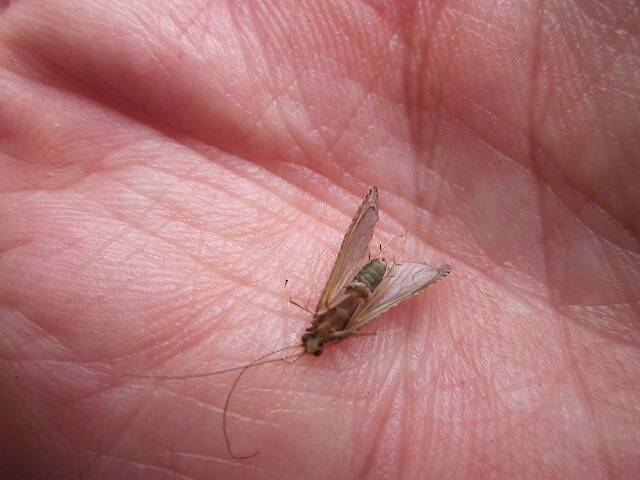
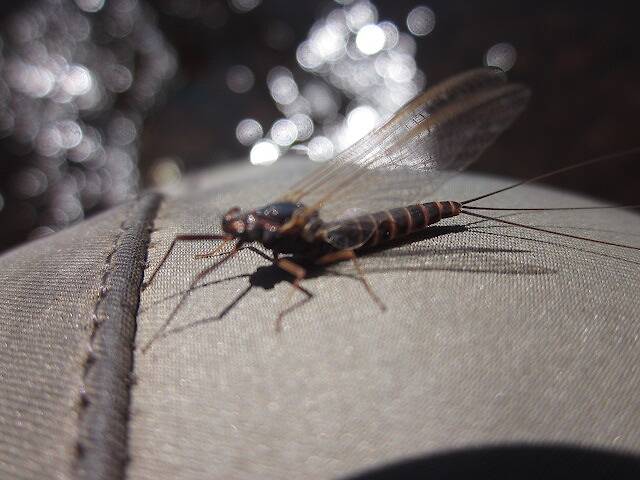
Entoman on Jun 21, 2011June 21st, 2011, 6:45 pm EDT
Hi Dave,
How can you tell from info available in the photo that this is positively a Hydropsychid? I agree it probably is, but your comments seem to imply you're pretty sure. Lacking a good look at the forewings and with only a ventral view to work with, I think I'm seeing a lack of setose warts on the mesoscutum and though the antennea are clearly longer than the body, I can't quite make out the presence of preapical spurs on the middle tibia. You mentioned the last abdominal segments. Is there something else I should be looking for?
Regards,
Kurt
How can you tell from info available in the photo that this is positively a Hydropsychid? I agree it probably is, but your comments seem to imply you're pretty sure. Lacking a good look at the forewings and with only a ventral view to work with, I think I'm seeing a lack of setose warts on the mesoscutum and though the antennea are clearly longer than the body, I can't quite make out the presence of preapical spurs on the middle tibia. You mentioned the last abdominal segments. Is there something else I should be looking for?
Regards,
Kurt
"It's not that I find fishing so important, it's just that I find all other endeavors of Man equally unimportant... And not nearly as much fun!" Robert Traver, Anatomy of a Fisherman
Creno on Jun 22, 2011June 22nd, 2011, 3:26 pm EDT
Good point. I guess I messed up there by assuming............ Oh well, not the last time I am sure, but hopefully I will get better. I am pretty sure I can see the hydropsychid type of 5 segmented maxillary palp. But that leaves a couple other families that cannot be ruled out by this picture.
The small black part I was hoping to see a better view of is the tip of the aedeagus. This is often black in many of the Hydropsyche scalaris group, and has a distinctive shape.
A good view of the mesoscutum would indeed help with a family determination, however, this structure is located dorsally and not visible in the picture.
The small black part I was hoping to see a better view of is the tip of the aedeagus. This is often black in many of the Hydropsyche scalaris group, and has a distinctive shape.
A good view of the mesoscutum would indeed help with a family determination, however, this structure is located dorsally and not visible in the picture.
PaulRoberts on Jun 22, 2011June 22nd, 2011, 7:23 pm EDT
Well Dave, you have a lot better argument for your guess than I do mine. I just saw the rust and olive on it, and along with the E. invaria images, thought it was the same Hydropsyche I fished over back in NY. I wonder too, Spence, if there were Flox flowering in the shady groves streamside?
Entoman on Jun 23, 2011June 23rd, 2011, 9:05 am EDT
Dave -
Wished I could say that (though your informing me of the Hydropsyche/Ceratopsyche realignment reversal is a big help). Would the Ames book you mention also help with this? I've been reluctant to fork out the coin because the title implies "eastern only" info and my library is overflowing already with books I never look at.
Good stuff. Will use for future reference.
Ha! Of course it's dorsal. My bad... Formed an opinion from viewing another photo for comparison and then mixed them (photos) up in my mind. Confused even myself (which isn't hard to do).:) Thanks for pointing it out. The presence of single preapical spurs on the middle tibia could be the easiest to make out in a sharper closeup though and would indicate Hydropsychid?
Paul - Yeah, color is tough as a lot of 'em are capable of having a similar olive abdomen with contrasting brownish/tannish thorax.
Regards,
Kurt
I never found separating Ceratopsyche and Hydropsyche adults difficult, especially in the west.
The small black part I was hoping to see a better view of is the tip of the aedeagus. This is often black in many of the Hydropsyche scalaris group, and has a distinctive shape
A good view of the mesoscutum would indeed help with a family determination, however, this structure is located dorsally and not visible in the picture.
Paul - Yeah, color is tough as a lot of 'em are capable of having a similar olive abdomen with contrasting brownish/tannish thorax.
Regards,
Kurt
"It's not that I find fishing so important, it's just that I find all other endeavors of Man equally unimportant... And not nearly as much fun!" Robert Traver, Anatomy of a Fisherman
Creno on Jun 23, 2011June 23rd, 2011, 2:41 pm EDT
For a fisherman trying to determine trout stream caddis to whatever level I would recommend Ames' books. But I would recommend the Ames' books to a taxonomist as well as they provide a different perspective. If you have the critter in hand, and a good scope, get a copy of: Schmid, F. 1998. The insects and arachnids of Canada, Part 7. Genera of the Trichoptera of Canada and adjoining or adjacent United States. Ottawa, NRC Research Press. Besides, didn't we have a talk about cost before? Sell some of that old fishin stuff ya can't take with ya :-)
There are lots of other characters for which a better photo would make one more confident in a determination. But presence/absence of a foreleg spur won't get you to genus.
There are lots of other characters for which a better photo would make one more confident in a determination. But presence/absence of a foreleg spur won't get you to genus.
PaulRoberts on Jun 23, 2011June 23rd, 2011, 3:08 pm EDT
Dave, I saw that Ames caddis book was for Eastern caddis. Is there enough overlap for the West?
Entoman on Jun 23, 2011June 23rd, 2011, 6:05 pm EDT
Dave -
Thanks again for the info. You're right about the penny pinching since I obviously enjoy this stuff almost as much (almost). :)
Heck... I was worried about even getting the family right with this specimen:) Genus is the next level of ball.
Paul -
You didn't read my previous post? My feelings are hurt... :) Question asked by me and answered by Dave already.
Kurt
Thanks again for the info. You're right about the penny pinching since I obviously enjoy this stuff almost as much (almost). :)
But presence/absence of a foreleg spur won't get you to genus.
Heck... I was worried about even getting the family right with this specimen:) Genus is the next level of ball.
Paul -
You didn't read my previous post? My feelings are hurt... :) Question asked by me and answered by Dave already.
Kurt
"It's not that I find fishing so important, it's just that I find all other endeavors of Man equally unimportant... And not nearly as much fun!" Robert Traver, Anatomy of a Fisherman
PaulRoberts on Jun 24, 2011June 24th, 2011, 9:57 am EDT
Sorry Kurt. I did, but didn't put it together. Been so busy I've been just dropping in and out here.
Entoman on Jun 24, 2011June 24th, 2011, 10:08 am EDT
Ha! Just kidding Paul. Nobody's guiltier of quick scanning posts or forgetting what was just read than me at times:):) Gave me an opening I couldn't resist, especially after just confessing I'd mixed up photos and body parts! :)
"It's not that I find fishing so important, it's just that I find all other endeavors of Man equally unimportant... And not nearly as much fun!" Robert Traver, Anatomy of a Fisherman
Oldredbarn on Jul 7, 2011July 7th, 2011, 8:31 am EDT
I wonder too, Spence, if there were Flox flowering in the shady groves streamside?
Paul...I was re-reading this post when I spotted this question of yours and the answer is yes...I have a Serviceberry tree on the side of my house and it is usually just past peak on the blossoms when I head up in late May, but all the way up north, especially north of West Branch I start seeing them blooming wild in the woods along the highway and have come to equate this happening and my annual trip.
I have actually purchased a "Wild Flowers of Michigan" book and have been working on a pretty good checklist...This started after I was driving one day nosing around in the Mason Tract and I spotted one lone red flower in the middle of a field...I ran over and snapped its picture and then went off trying to figure out what is was...It was a Wood Lily (Lilium philadelphicum). (I apologize to Tony for the inclusion of Philly here in the scientific name...I think there was a Philosopical Society over that way once and Mr. Jefferson and B Franklin hung out there...One of the first papers on our lovely mayfly was presented there way back when)...
When I was fairly young I spent my summers with my grandparents in northern Michigan. My grandmother grew up there and had a wonderful "folk" knowledge of wild plants etc...Her and I would spend hours in the woods gathering berries and I wish I had paid a little better attention or wrote this stuff down. I think I was too busy wondering if there were black bear about...One of needed to be paying attention and it might as well be the neurotic grandson...:)
There was a little berry out there that she loved and it had little spikes or thorns that had to be removed before you ate them...My aunt was trying to impress her mother-in-law and tried to bake a pie with them and forgot to remove these and its been a family joke ever since.
Anyway...There are water Orchis like plants along some of the edges of the Au Sable and they get a little purple blossom and this is used as a sign that there should be Hex about...It's nice to not just put on blinders and just focus on the fishing...There has been a lot of references in the fly fishing literature over the years about equating certain hatches and blooming trees or flowers.
Spence
The Marsh Marigolds (Caltha palustris) is my favorite in late May along the stream...
"Even when my best efforts fail it's a satisfying challenge, and that, after all, is the essence of fly fishing." -Chauncy Lively
"Envy not the man who lives beside the river, but the man the river flows through." Joseph T Heywood
"Envy not the man who lives beside the river, but the man the river flows through." Joseph T Heywood
PaulRoberts on Jul 7, 2011July 7th, 2011, 5:48 pm EDT
Phenology is a rough sort of "study". The associations, when I've looked close, tend to be pretty rough approximations. It's one of those things that is more complex than most realize, yet we still try to make predictions with it.
I once tried to associate plum blossoms with the largemouth spawn. Problem was, some individual plants flowered weeks earlier than others. One guy tried to tell me that the morels pop when the aspen leaves are the size of "squirrel ears" (yes, the proverbial squirrel ears again -something that seems to pass for some sort of wisdom I guess). I have two aspen groves on my property and they are genetically distinct. One leafs out 3 full weeks earlier than the other.
When I looked at the bass spawn intensively--recording observations including temperature profiles of ponds of varying volume over three years--I found that the spawn initiated over a period of about three weeks. Add lakes to the mix and it stretches over months. Which left me to ask when I hear about "squirrel ears" again -just which plant and which pond??
Yes there are external triggers for biological events like spawns, emergences, and flowering, as well as endogenous rhythms. But the reasons for each respective one are not exactly tied, at least in an easily predictable manner -much as we'd love to simplify it all. That said, such events are most affected by our local star and each individual collects and displays that solar energy in its actions. Problem is, no two individuals share the same history -hence the variability that drives evolution.
Oh yes...it's Phlox, not Flox as I first spelt it.
I once tried to associate plum blossoms with the largemouth spawn. Problem was, some individual plants flowered weeks earlier than others. One guy tried to tell me that the morels pop when the aspen leaves are the size of "squirrel ears" (yes, the proverbial squirrel ears again -something that seems to pass for some sort of wisdom I guess). I have two aspen groves on my property and they are genetically distinct. One leafs out 3 full weeks earlier than the other.
When I looked at the bass spawn intensively--recording observations including temperature profiles of ponds of varying volume over three years--I found that the spawn initiated over a period of about three weeks. Add lakes to the mix and it stretches over months. Which left me to ask when I hear about "squirrel ears" again -just which plant and which pond??
Yes there are external triggers for biological events like spawns, emergences, and flowering, as well as endogenous rhythms. But the reasons for each respective one are not exactly tied, at least in an easily predictable manner -much as we'd love to simplify it all. That said, such events are most affected by our local star and each individual collects and displays that solar energy in its actions. Problem is, no two individuals share the same history -hence the variability that drives evolution.
Oh yes...it's Phlox, not Flox as I first spelt it.
Jmd123 on Jul 7, 2011July 7th, 2011, 6:43 pm EDT
Don't know if I need to jump into this discussion in any detail, but I'll just mention that I have a BS in botany from the University of Michigan (1986) and I do a lot more of that in my work than the entomology stuff. (Which is fine, gets me outside whereas the ento work just gets me crossed eyes and a sore neck!) At least that's MY excuse for posting wildflower pictures on here...And as far as "ears" go, a mushroom guide by the late great Alexander H. Smith states that the "white morels" - Morchella esculenta - are supposed to be found around the same time as the oak leaves have reached the "mouse ear" stage...
And Spence, I'm guessing those spiny beries are some kind of currant or gooseberry - unless your aunt was picking prickly pear cactus fruits! Which would be thoroughly uncomfortable without removing those tiny spines...
Jonathon
And Spence, I'm guessing those spiny beries are some kind of currant or gooseberry - unless your aunt was picking prickly pear cactus fruits! Which would be thoroughly uncomfortable without removing those tiny spines...
Jonathon
No matter how big the one you just caught is, there's always a bigger one out there somewhere...
Quick Reply
Related Discussions
Topic
Replies
Last Reply
9
Jun 13, 2008
by Wiflyfisher
by Wiflyfisher

